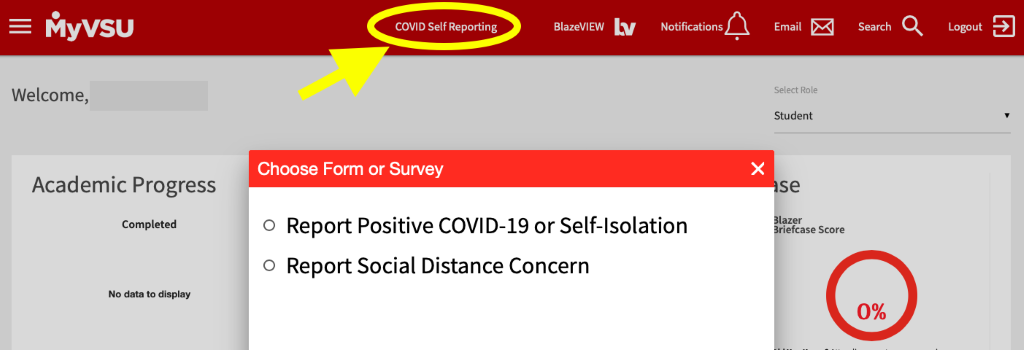Campus Message - July 7, 2020
For the most recent campus messages, please visit our Coronavirus news center.
Updated Guidance on Requirements for Facial Coverings and Definitions of High-Risk Populations
Faculty, Staff, and Students,
Recently, the University System of Georgia (USG) announced changes for managing COVID-19-related issues on all campuses, including Valdosta State University, following updated guidance from the Centers for Disease Control and Prevention (CDC). This recent update contains guidance regarding the wearing of face coverings, as well as definition changes pertaining to age/underlying medical conditions.
Effective July 15, 2020, all USG institutions, including Valdosta State University, will require all faculty, staff, students, and visitors to wear an appropriate face covering while inside campus facilities and buildings. Further details are included in the information at the end of this message, and on our Coronavirus Updates website.
We appreciate everything you continue to do to support the health and success of our Blazer community. Additional updates may be located on VSU’s website as they are received.
Dr. Richard Carvajal
President
Updated Guidance on Age, Underlying Medical Conditions, Use of Face Coverings
Recently the Centers for Disease Control and Prevention (CDC) updated its guidance for managing COVID-19 related issues. Among the changes are to definitions for people who will need extra precaution due to age and underlying medical conditions. In response to those changes from the CDC, the University System of Georgia is providing updated guidance on the wearing of face coverings and for who is eligible to seek alternate work arrangements due to falling into one of these categories.
Older Adults
The CDC no longer gives a minimum age for those at risk. The USG will continue to use 65 as its measure for evaluating requests for alternate work arrangements. Individuals who are younger than 65 can provide documentation from a health care provider that their age is a determining factor for risk that should prevent them from working on campus as scheduled.
People of Any Age with Underlying Medical Conditions
People with the following underlying medical conditions may request alternate work arrangements under the previously developed process:
- Chronic kidney disease
- COPD (chronic obstructive pulmonary disease)
- Immunocompromised state (weakened immune system) from solid organ transplant
- Obesity (body mass index [BMI] of 30 or higher)
- Serious heart conditions, such as heart failure, coronary artery disease, or cardiomyopathies
- Sickle cell disease
- Type 2 diabetes mellitus
- Asthma (moderate-to-severe)
- Cerebrovascular disease (affects blood vessels and blood supply to the brain)
- Cystic fibrosis
- Hypertension or high blood pressure
- Immunocompromised state (weakened immune system) from blood or bone marrow transplant, immune deficiencies, HIV, use of corticosteroids, or use of other immune weakening medicines
- Neurologic conditions, such as dementia
- Liver disease
- Pregnancy
- Pulmonary fibrosis (having damaged or scarred lung tissues)
- Smoking
- Thalassemia (a type of blood disorder)
- Type 1 diabetes mellitus
Use of Face Coverings
Effective July 15, 2020, University System of Georgia (USG) institutions will require all faculty, staff, students, and visitors to wear an appropriate face covering while inside campus facilities/buildings, since six feet social distancing may not always be possible. Face covering use will be in addition to and is not a substitute for social distancing.
Face coverings are not required in one’s own dorm room or suite, when alone in an enclosed office or study room, or in campus outdoor settings where social distancing requirements are met.
Anyone not using a face covering when required will be asked to wear one or must leave the area. Repeated refusal to comply with the requirement may result in discipline through the applicable conduct code for faculty, staff or students.
Reasonable accommodations may be made for those who are unable to wear a face covering for documented health reasons.
REPORT HEALTH CONCERNS
Key term: Close Contact - this is defined as being within six (6) feet of an individual for more than 15 minutes regardless of whether a face covering is worn.
EMPLOYEES DO NOT come on campus if you believe you have been in close contact with a person having COVID or yourself having symptoms or receiving a positive diagnosis. Instead, notify your supervisor of your absence, seek medical services from your primary care provider, and self-report your information by completing the online form or contacting HR directly at 229-333-5709.
STUDENTS DO NOT come on campus nor go directly to the Student Health Center if you believe you have been exposed to COVID. Instead, call the Health Services at 229-333-5886 to speak with a triage nurse over the phone. Additional guidance will be provided on how to access the health center facility. The health center remains open for walk-in patients with non-COVID medical needs.
Members of the campus community should report all instances of close contact with a person having COVID or themselves receiving a positive diagnosis of COVID. To assist with reporting, a COVID Self Reporting link has been added within MyVSU.

If you have been instructed to self-isolate or quarantine, you should do so at your permanent home for the period given unless it should be extended due to remaining symptoms.
- Student Health Center
- 229.333.5886
- After-Hours
- 229.259.2083
-
Mailing Address
1500 N. Patterson St.
Valdosta, GA 31698